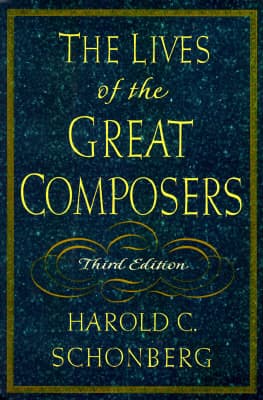
Book Review Summary: The Lives of the Great Composers
Introduction
"The Lives of the Great Composers" by Harold C. Schonberg is a captivating biographical exploration of the lives and works of the most influential figures in classical music. In this new edition, Schonberg delves into the personal and professional journeys of composers such as Bach, Mozart, Beethoven, and Stravinsky, while also shedding light on lesser-known names like Gilbert and Sullivan, the Strausses, and women composers throughout history. With its rich detail and anecdotes, this book offers readers a comprehensive understanding of the evolution of music and the impact of each composer on their respective eras.
About Harold C. Schonberg
Harold Charles Schonberg was an American music critic and journalist, best known for his work at The New York Times. He was the first music critic to win the Pulitzer Prize for Criticism in 1971, solidifying his position as a respected authority in the field. Schonberg authored several books on musical subjects, including "The Lives of the Great Composers," which showcases his extensive knowledge and passion for classical music.
Analysis of Views
-
A Comprehensive Overview: Readers appreciate the book's comprehensive coverage of classical composers, from Monteverdi to Copland. The 10-15 page chapters devoted to each composer provide a concise yet informative overview of their lives and works, making it an ideal resource for both casual readers and music enthusiasts.
-
Engaging Writing Style: Schonberg's writing style is praised for its engaging and accessible nature. His ability to convey complex ideas in a clear and concise manner makes the book enjoyable to read, even for those with limited knowledge of classical music.
-
Insightful Analysis: The book offers insightful analysis of the composers' lives, their works, and their impact on society. Schonberg delves into the historical context of each composer's time, exploring how they navigated patronage systems, public demand, and artistic innovation. This depth of analysis adds depth to readers' understanding of classical music history.
-
Balanced Perspective: While some readers find Schonberg's subjective opinions and occasional cattiness distracting, others appreciate his ability to provide a balanced perspective. He does not shy away from calling out other authors for their lack of appreciation for certain composers, while also highlighting those who were overlooked or underappreciated during their time.
-
Recommendations: Many readers recommend this book as a valuable resource for anyone interested in classical music. They appreciate the wealth of information provided and find it helpful in deepening their appreciation of the composers and their works. Some readers also recommend pairing this book with a premium Spotify subscription to create playlists that match their reading experience without having to spend large sums of money on operas.
Reasons for Recommendation
-
Comprehensive Coverage: The book covers a wide range of composers and provides a concise yet informative overview of their lives and works. This comprehensive coverage makes it an excellent resource for anyone interested in classical music history.
-
Engaging Writing Style: Schonberg's writing style is praised for its accessibility and engaging nature. His ability to convey complex ideas in a clear and concise manner makes the book enjoyable to read, even for those with limited knowledge of classical music.
-
Insightful Analysis: The book offers insightful analysis of the composers' lives, their works, and their impact on society. Schonberg delves into the historical context of each composer's time, providing readers with a deeper understanding of classical music history.
Reasons for Not Recommendation
-
Subjective Opinions: Some readers find Schonberg's subjective opinions and occasional cattiness distracting from the book's overall value. They prefer a more objective approach to understanding classical music history.
-
Limited Depth: While the book provides a comprehensive overview of composers' lives and works, some readers feel that it lacks depth in certain areas. They wish there were more in-depth explorations of certain composers or periods in classical music history.
Conclusion
"The Lives of the Great Composers" by Harold C. Schonberg is a highly recommended resource for anyone interested in classical music history. With its comprehensive coverage of composers from Monteverdi to Copland, engaging writing style, insightful analysis, and balanced perspective, this book offers readers a valuable understanding of the evolution of music and the impact of each composer on their respective eras. While some readers find Schonberg's subjective opinions distracting or wish for more depth in certain areas, overall, "The Lives of the Great Composers" is a valuable addition to any music enthusiast's library.